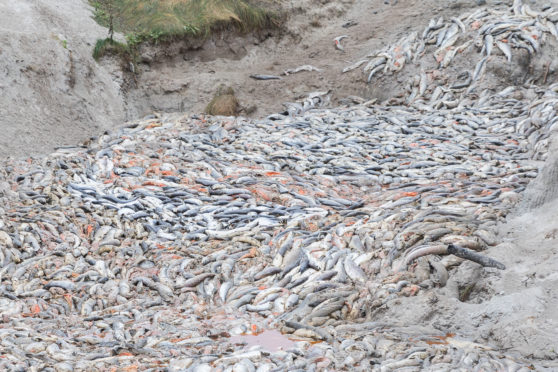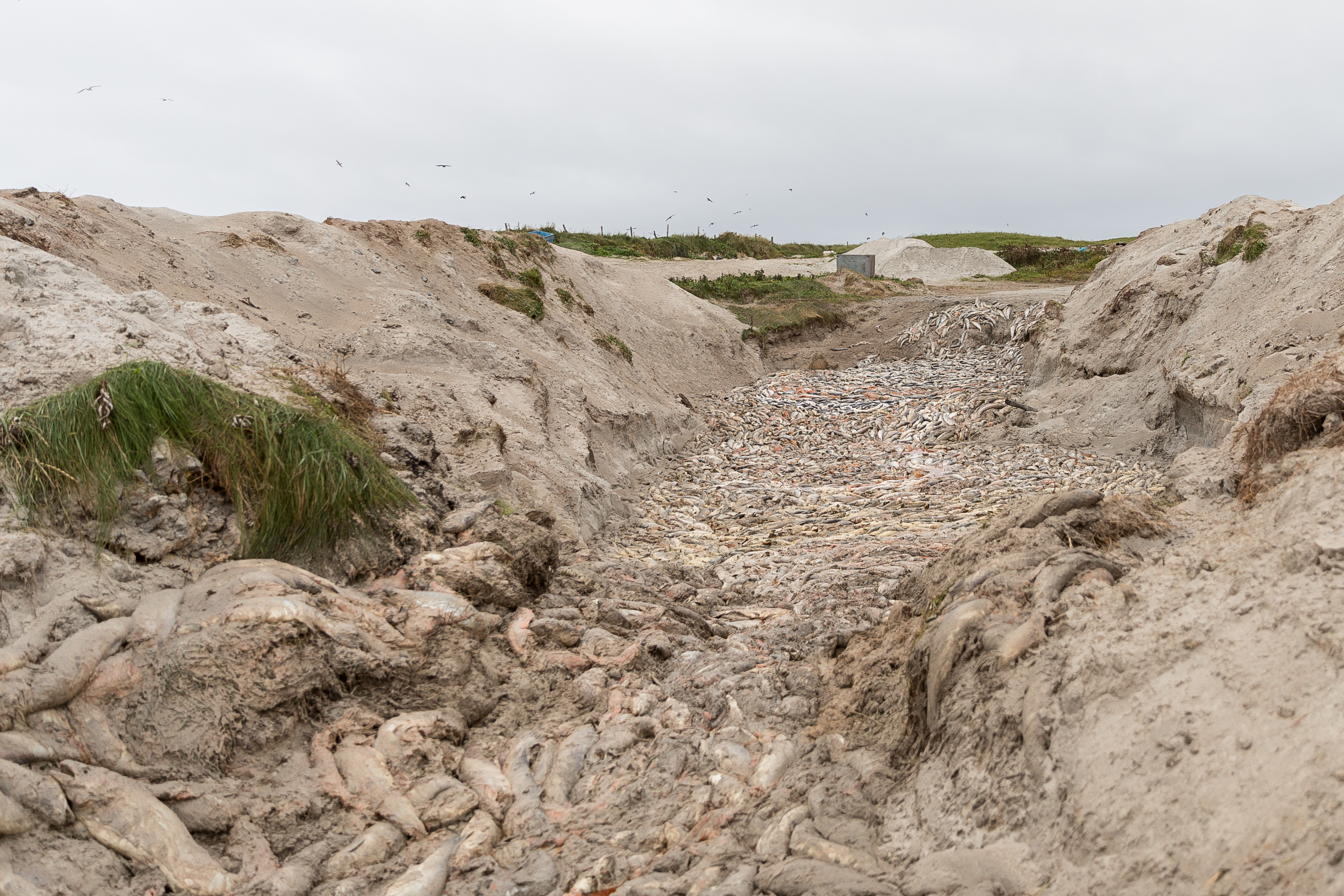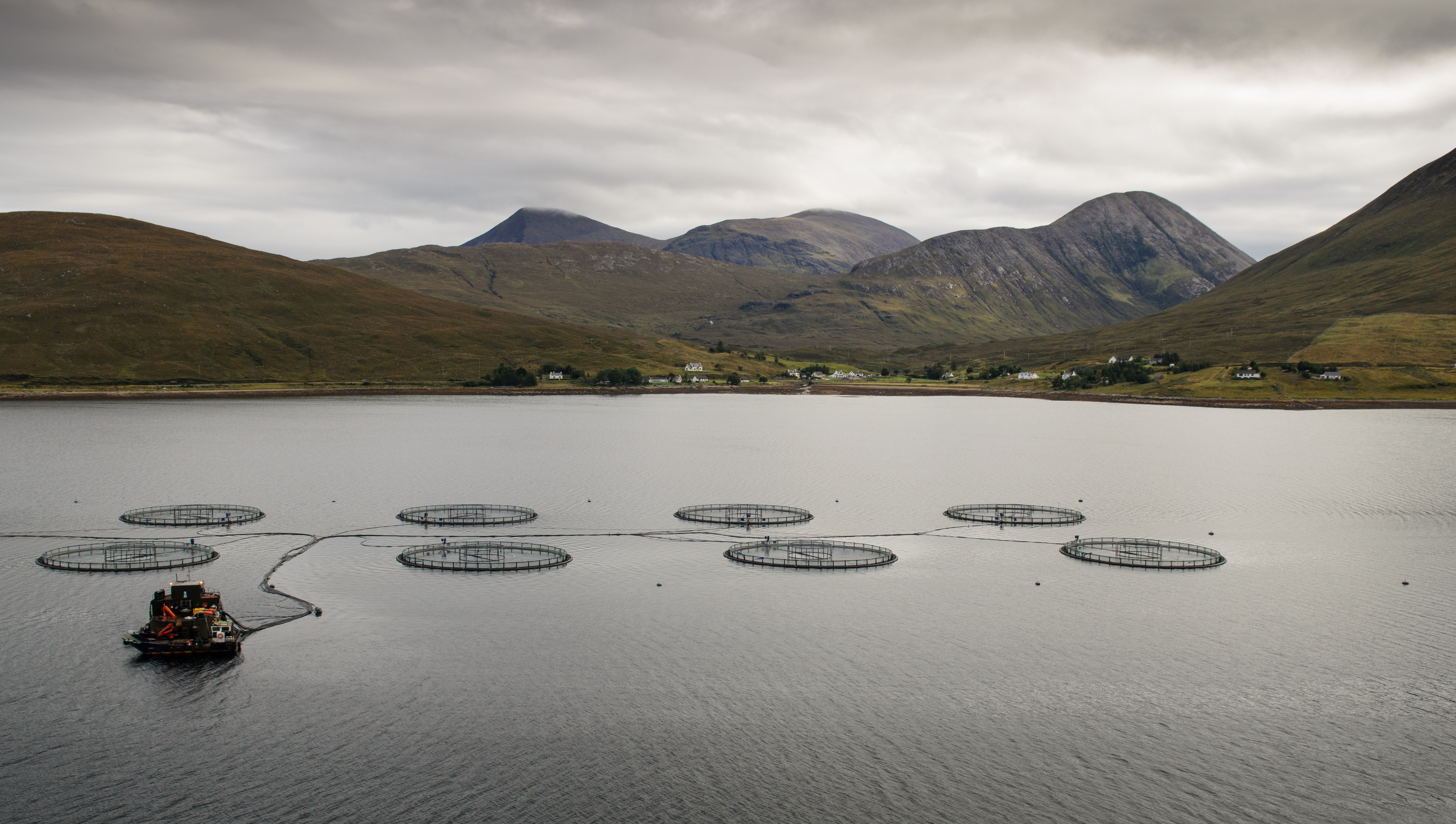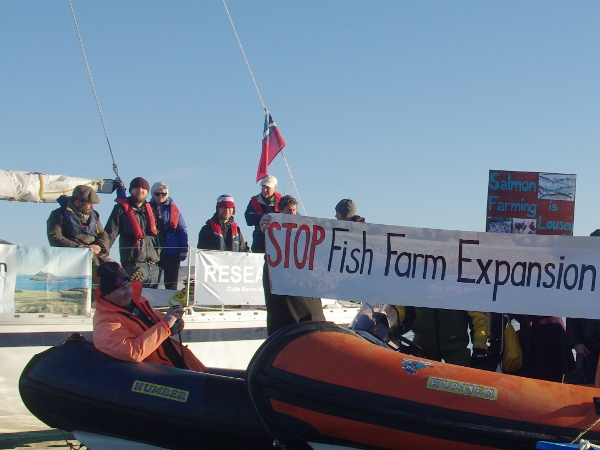
A proposed new salmon farm to be built off the coast of the Isle of Arran has been met with fury by locals and environmentalists.
The proposal, put forward by the Scottish Salmon Company (SSC) sets out a planning process for the farm to be built in an unspoiled area in the north-east of the island.
SSC came to the island to initiate talks with the community, but the event was stormed by an angry mob of 160 angry locals who believe the environmental impacts of the new farm could be catastrophic.
The group wished to have their questions answered by the SSC representatives in attendance, SSC CEO, Craig Anderson and SSC Head of Site Development, Marc Browne. But their requests were reportedly refused, leading to booing and a mass walk out.
Arran’s marine specialist group, Community of Arran Seabed Trust (COAST) have also slammed the proposals, having previously successfully halted the expansion of Arran’s current fish farm in Lamlash following a local campaign.
COAST executive director, Paul Chandler said: “The company want to build a mega salmon farm off the coast of the island weighing 5000 metric tonnes which equates to roughly 1m salmon.
“We want a halt to expansion until the industry proves itself to be sustainable.”
The COAST exit poll after the recent SSC talks on Arran had 89% against, 10% undecided and 1% in favour of the new salmon farm.
COAST have now launched a petition calling for a halt on the proposals, which currently has over 3,200 signatures – over 60% of the island’s permanent population.
On their website, COAST claim that SSC holds four of the top places as the “liciest salmon company in Scotland.” They also claim the proposed site will not only spoil the enjoyment of a previously undeveloped part of the island, but also disturb the native wildlife such as otters, seals, porpoises and basking sharks.
John McGovern, a land owner on Arran, said: “The amount of waste and environmental damage caused by these farms is disgusting.
“Children enjoy playing on the beaches on Arran, and you often see kids in the water not far from where the SSC is wanting to build their new farm.
“I wouldn’t want my dog near the stuff that comes out of them, never mind my children.”
But SSC claim the proposed new farm would have positive benefits for the island.
Craig Anderson, Chief Executive of The SSC, said: “The Isle of Arran has played a long-term role in our business and our Lamlash Bay site, one of the first fish farms in Scotland, was established over 30 years ago.
“Our proposal will bring additional economic and social benefits.
“We will look to recruit up to 10 additional full time members of staff and the site will add an additional £10 million to the economy annually.
“This is estimated to support a further 41 jobs in the Scottish supply chain, plus a further 10 jobs in the wider Scottish economy.”
Environmentalists across the world have been campaigning for the closing of fish farms, including those in Scotland, whose presence has been blamed for the depreciation of wild salmon and fish stocks over recent years.
Scottish marine activist, Corin Smith has produced a wide range of reports and images which show the negative impacts of aquaculture.
He said: “It is a pile ’em deep, treat ’em cheap mentality. Diseases are rife such as CMS, Salmon Pox and others, which are very harmful to Atlantic salmon and no research has been done to determine the effects and rate of transfer to wild populations.
“A carnivorous fish, farmed salmon is produced using fish caught in the wild for them to eat. Some sources say that it takes as much as 5kg of wild fish to produce 1kg of farmed fish.
“Tens of thousands of tonnes of mortalities therefore equates to up to 50,000 tonnes of wild fish stocks being wasted.
(Video by Corin Smith)
Another major problem associated with salmon and fish farming is sea lice, which spread disease and can be passed on to passing wild animals. The lice are treated by a number of controversial methods.
One process involves masses of hydrogen-peroxide, with which fish are jet washed in tubular containers aboard barges, before both the fish and the toxic chemical are shot back into the ocean.
Another is by using cleaner wrasse, a small fish which are imported from the wild to eat the parasites off the farmed salmon. This week, the Channel Islands imposed a ban on exporting the small fish to Scotland, whose value has sky-rocketed thanks to fish farms’ mass acquisition of the creatures. The Angling Trust supports the ban.
This week, online investigative journalism publication, The Ferret revealed that nine million fish had been killed by disease at Scottish salmon farms, with caged salmon companies reporting over 760 mass deaths in the last three years.
Environmentalists like Mr Smith blame the intensive nature of the farms for the high mortality rates and think it’s too late to make the industry sustainable in the way it currently operates.
“Eggs have nothing to do with mortality. In the wild, it is when salmon change from smolt to fish that mortality is recorded so the number of eggs don’t even come into question. It is a pointless way to analyse or explain the figures,” he said.
“Saying the industry can be made more sustainable is like saying there was a way to make open sewers in Victorian times more hygienic. As it is now, salmon farming is just completely unsustainable, full stop,” he added.
“Eventually, the whole industry will have to be moved on to land. This will benefit the ecosystem of the sea and reduce spreading of disease within farms, but would arguably still be cruel to the fish in the same way battery farming can be seen as cruel to animals on land.”
Salmon farming is one of Scotland’s most lucrative industries, and currently provides over 12,000 jobs nation-wide.
Mr Anderson continued: “Fish health and welfare and our environment are fundamental to our business and we take our responsibility very seriously. We respect and appreciate the many users of our seas and the importance of working together.
“Our proposal has innovation at its heart and aims to deliver responsible and sustainable development. The guiding principal for this proposed development is to deliver improved fish welfare and enhanced environmental management.
“Salmon farming is a highly regulated industry. We are still in the early stages of this proposal and are currently consulting with a range of stakeholders including North Ayrshire Council, SEPA, Scottish Natural Heritage and Marine Scotland. Their feedback, alongside the views of the local community, will be crucial in determining the final shape of our plans.”

Enjoy the convenience of having The Sunday Post delivered as a digital ePaper straight to your smartphone, tablet or computer.
Subscribe for only £5.49 a month and enjoy all the benefits of the printed paper as a digital replica.
Subscribe


